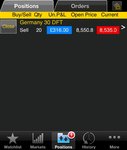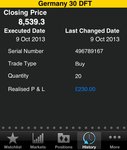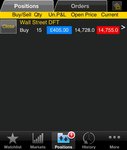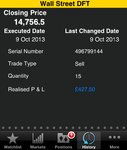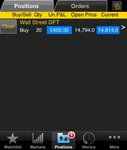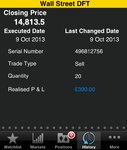Thank you for this thread. Always interesting to see how others trade.
You may wish to do a study of your trades during the European session compared with the trades taken after the US markets have opened. You might find that your strike rate is lower in the US session trades, you are relying more on your "feel" for the market when the trade is not working as expected, and perhaps the average profit per trade is lower. If the statistics confirm this hypothesis, you know what to do! Your post #14, October 7, selling the return to the opening range during the US session (at price 8594) is one of only two trades on this thread that I don't really like.
(if you do learn that trading in during the US session is less productive, there is the benefit of less time sitting in the chair...or standing at your desk?...which isn't good for back...or eyes...or health in general)
The other trade I'm not sure about is your post #35, today, the rejection off resistance zone. It is clear that you have enough experience and "feel" to recognise when the market is not doing what you expect, and to act accordingly. Just to highlight to others reading the thread that this is an important skill to develop. Could you explain a little more about what triggered the trade? Resistance and the RSI divergence? It is interesting that you use an indicator with a look back period including out of hours data. You know from your mentor about the games which can be played by large traders around opens, and you also know that most people are not participating pre market. So perhaps a study of whether these divergence trades are less reliable around the open can also improve your results? (e.g. if your RSI is N period, cannot take RSI signals until N*bar interval after the 08.00 open)
It is clear that you are on the right track, especially as you are still looking for ways to improve your trading. This is an excellent trait to keep you focused and not become complacent with your success. I can relate to your early blunders with trading and your persistence - I joined up here circa 2006 and spent considerable time chasing my tail. I was also fortunate enough to have a mentor point out where the "games" are being played - its night and day when you've learned where not to trade. That doesn't even occur to many. The help you received clearly set you about trading in a far more structured manner. So newbies would do well to follow your contributions carefully.
"I may regret that exit!". Interesting. I think how quickly you can let go of your forecast, control your ego, and follow your intuition when the trade is not developing as expected is one of the single most important areas of focus and can make the difference between a mediocre trader and a very good trader. You do that very well on trades which are beginning to behave "iffy", so don't regret too much!
The second area of focus which has a massive effect on your long term results is compounding. Difficult to do at first when you must make regular withdrawals to cover your living expenses- so live humbly, frugally, and low profile. Retaining as much profit as possible to back a bigger position size with which to trade, up to the limit the market will support, is key. If you can continue this level of consistency through various market cycles, trading 10 contracts on the exchange by the end of next year is feasible.
A final word about being low profile. I respect your intention to share and help others. But in less anonymous real life, you might want to be a little more private about your results, as otherwise it can attract the wrong sorts of attention. Human nature being as it is, there may come a time when you must re-evaluate whether to continue posting here also.
Cheers and continued success.


